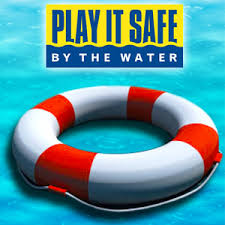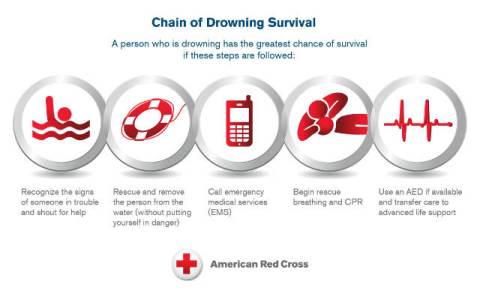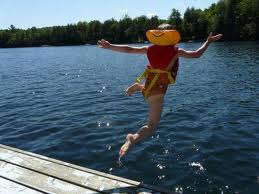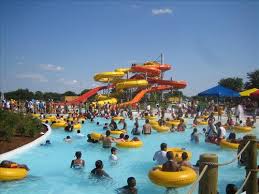
Take Steps to Stay Safe Around Water
Pools, lakes, ponds and beaches mean summer fun and cool relief from hot weather. But, water also can be dangerous, if you don't take proper precautions. Nearly 1,000 kids die each year by drowning and most drownings occur in the home swimming pools. It is the second leading cause of accidental death for people between the ages of 5 and 24.
The good news is there are many ways to keep your family safe in the water and make sure your children take the right precautions when they're on their own.
Take the Water Safety Quiz offered by the American Red Cross.
Swimming
- Swim in designated areas supervised by lifeguards.
- Always swim with a buddy; do not allow anyone to swim alone.
- Never leave a young child unattended near water and do not trust a child’s life to another child; teach children to always ask permission to go near water.
- Have young children or inexperienced swimmers wear U.S. Coast Guard-approved life jackets around water, but do not rely on life jackets alone.
- Maintain constant supervision.
- Make sure everyone in your family learns to swim well. Enroll in age-appropriate learn-to-swim courses.
- If you have a pool, secure it with appropriate barriers. Many children who drown in home pools were out of sight for less than five minutes and in the care of one or both parents at the time.
- Avoid distractions when supervising children around water.
- If a child is missing, check the water first. Seconds count in preventing death or disability.
- Have appropriate equipment, such as reaching or throwing equipment, a cell phone, life jackets and a first aid kit.
- Know how and when to call 9-1-1 or the local emergency number.
- Enroll in home pool safety, water safety, first aid and CPR/AED courses to learn how to prevent and respond to emergencies.
- Protect your skin. Limit the amount of direct sunlight you receive between 10:00 a.m. and 4:00 p.m. and wear sunscreen with a protection factor of at least 15.
- Drink plenty of water regularly, even if you’re not thirsty. Avoid drinks with alcohol or caffeine in them.

Home Pool and Spa
Having a fence (one that goes directly around the pool or spa) between the water and your house is the best safety investment you can make and will help prevent pool-related drownings.
- Secure your pool with appropriate barriers. Completely surround your pool with a 4-feet high fence or barrier with a self-closing, self-latching gate. Place a safety cover on the pool or hot tub when not in use and remove any ladders or steps used for access. Consider installing a pool alarm that goes off if anyone enters the pool.
- Keep children under active supervision at all times. Stay in arm’s reach of young kids. Designate a responsible person to watch the water when people are in the pool—never allow anyone to swim alone. Have young or inexperienced swimmers wear a U.S. Coast Guard-approved life jacket.
- Ensure everyone in the home knows how to swim well by enrolling them in age-appropriate water orientation and learn-to-swim courses from the Red Cross.
- Keep your pool or hot tub water clean and clear. Maintain proper chemical levels, circulation and filtration. Regularly test and adjust the chemical levels to minimize the risk of earaches, rashes or more serious diseases.
- Establish and enforce rules and safe behaviors, such as “no diving,” “stay away from drain covers,” “swim with a buddy” and “walk please.”
- Ensure everyone in the home knows how to respond to aquatic emergencies by having appropriate safety equipment and taking water safety, first aid and CPR courses.
- Hot tubs may feel great to adults, but kids can become dangerously overheated in them and can even drown — so it's best not to let them use them at all.
Beaches, Lakes, and Ponds

Teach kids never to swim alone. Using the buddy system means there's always someone looking out for you. Make sure your kids understand that swimming in a pool is different from swimming in a lake or the ocean — there are different hazards for each.
- Lake or Pond
- Don't let kids swim without adult supervision — lakes or ponds may be shallow near the bank and then increase in depth sharply further out from shore.
- Ponds and lakes may hide jagged rocks, broken glass, or trash.
- Watch out for weeds and grass that could entangle a leg or arm.
- Most boating accidents, particularly among teenagers, are related to alcohol. When you and your family are boating, assign a designated driver who won't drink. Be sure teens know about the dangers of alcohol, on and off the water.
- Beaches
- Check conditions before entering the water. Check to see if any warning flags are up or ask a lifeguard about water conditions, beach conditions, or any potential hazards
- Swim only at a lifeguard-protected beach, within the designated swimming area. Obey all instructions and orders from lifeguards.
- Make sure you swim sober and that you never swim alone. And even if you’re confident in your swimming skills, make sure you have enough energy to swim back to shore.
- Have young children or inexperienced swimmers wear U.S. Coast Guard-approved life jackets in and the around water. No one should use any other type of floatation device unless they are able to swim.
- Don’t dive headfirst—protect your neck. Check for depth and obstructions before diving, and go in feet first the first time.
- Pay especially close attention to children and elderly persons when at the beach. Even in shallow water, wave action can cause a loss of footing.
- Don't allow kids to swim in large waves or undertows, and tell them never to stand with their back to the water because a sudden wave can easily knock them over.
- Teach kids that if they're caught in a rip current or undertow, they should swim parallel to the shore or should tread water and call for a lifeguard's help.
- Stay at least 100 feet away from piers and jetties. Permanent rip currents often exist near these structures.
- If someone is in trouble in the water, get help from a lifeguard. If a lifeguard is not available, have someone call 9-1-1.Throw the victim something that floats – a lifejacket, cooler, inflatable ball and yell instructions on how to escape the current.
- The stings of jellyfish or Portuguese man-of-wars can be painful, so tell kids to avoid them in the water and to tell an adult right away if they're stung.
- Keep a lookout for aquatic life. Water plants and animals may be dangerous. Avoid patches of plants. Leave animals alone.
Water Parks

Water Parks can be a lot of fun for kids, as long as you keep safety in mind.
- Before you go, make sure the park is monitored by qualified lifeguards.
- Once there, read all posted signs before letting your child on any rides (many rides have age, height, weight, or health requirements, and each has a different depth of water).
- Follow all rules and directions, such as walking instead of running and always going down the water slide in the right position — feet first and face up.
- A Coast-Guard approved life jacket is a good idea.
- Know which rides are appropriate for your child's age and development. For example, wave pools can quickly go from calm to rough, putting even a good swimmer in over his or her head. Younger children can be intimidated by older kids' splashing and roughhousing.
Recreational Water Illnesses
Recreational water illnesses happen due to contact with contaminated water from recreational water sources like a swimming pool, hot tub, water fountain, water park, lake, or ocean. It is usually spread by swallowing, inhaling or coming into contact with water that is contaminated with germs.
A few tips to prevent getting a recreational water illness:
- Kids with diarrhea should not swim.
- Take kids on bathroom breaks often and change swim diapers often (not at the poolside).
- If you are taking a baby in the water who is not potty-trained, use a swim diaper.
- Wash hands after using the bathroom or changing diapers.
- Avoid swallowing or getting water in your mouth.
- Keep the swimming water clean by showering with soap before entering the pool.
- After swimming, dry ears well with a towel/washcloth, tilting each ear down to help water drip out of the ear canal. This can help prevent swimmer’s ear (an ear infection due to trapped water in the ear canal).
Sources: American Red Cross (www.redross.org) and Kids Health (www.kidshealth.org)
